Collection
- VOICES: Narratives by Survivors of Modern Slavery
- Alice Seeley Harris Archive
- Remembering 1807
- Murals
- Legacies on Display: Slavery in Museums 9 More
Theme
Country
- United States (slavery location)
- India (slavery location)
- India (trafficked from)
- United States (trafficked from)
- United Kingdom (slavery location) 20 More
Date
Location
Type
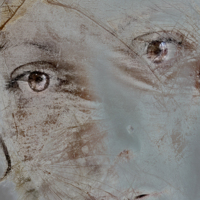
Bought and Sold, Somebody's Sister
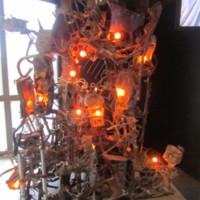
Freedom sculpture
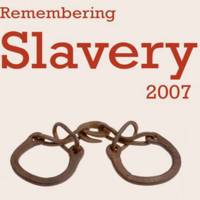
Remembering Slavery 2007
Remembering Slavery 2007 was a regional initiative involving museums, galleries and other cultural organisations across the North East of England in a programme of exhibitions, events, performances, lectures and activities to explore the themes of slavery and abolition, in both historical and modern…
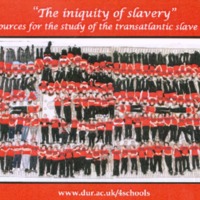
The Iniquity of Slavery
Durham University Library holds many archives relating to the slave trade in its Special Collections due to a connection with the family of abolitionist Granville Sharp. This is supplemented by material relating to the West Indies and the slave trade in the papers of the Prime Minister between 1830…

Vi
In 1999, Vi was one of about 250 workers brought from Vietnam on a labor contract. A South Korean businessman named Kil Soo Lee had bought a garment factory near Pago Pago, in American Samoa, and required sewing machine operators. Vi was recruited by a Vietnamese government-owned enterprise called…

Beatrice A
After several months in slavery, Beatrice Fernando reached the point of no return. Standing on a fourth-floor balcony in Beirut, Lebanon, she realized there was “no other way to get home” but to “dive backwards.” In a recent interview she explained of her decision to step off the balcony:…
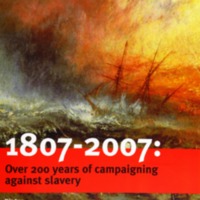
Anti-Slavery International, 2007
The world's oldest human rights organisation, Anti-Slavery International, led several initiatives in response to the bicentenary. The Fight for Freedom 1807-2007 Campaign, launched in 2005, called for measures to address the continuing legacies of the slave trade. The publication '1807-2007: Over…
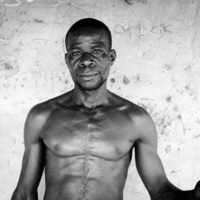
Slavery in Lake Volta
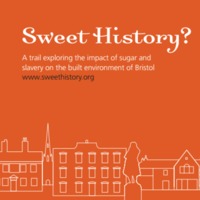
Sweet History?
The Sweet History? project saw the Bristol Architecture Centre work with young people from the Knowle West Media Centre to explore the social and economic impacts of the sugar and slave trades on the built environment heritage of Bristol. Working with local artists and historians, the young people…
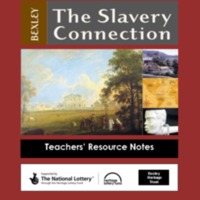
Bexley: The Slavery Connection
The 'Slavery Connection' project researched Bexley’s links with the transatlantic slave trade through the London borough's residents and buildings. The exhibition, which included objects from Bexley Museum, aimed to raise the level of understanding in local communities about the history of the…
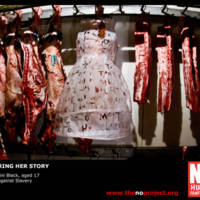
Wearing Her Story
In contrast to the trope that brands individuals’ experiences onto their backs, the No Project released a poster in 2012 titled “Wearing Her Story,” made by the artist Ismini Black. A woman’s dress hangs alongside carcasses in a butcher’s window. There are letters cut out of the dress and…
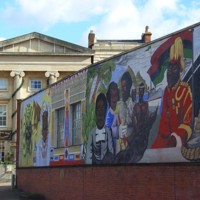
Reading Mural Black History
The project began in 1987 when Central Club approached Reading Borough Council about the possibility of a mural project. A project steering group was set up consisting of representatives of Central Club, Reading Borough Council and Berkshire County Council (who then ran Central Club as part of the…

Woman to Go
One major trope in 19th-century antislavery visual culture was the auction block, which featured in the Liberator masthead from 1831 to 1865 as a scene with crowds of onlookers. In 21st-century antislavery imagery, the auction block is back. In 2010, the Task Force on Human Trafficking opened an…
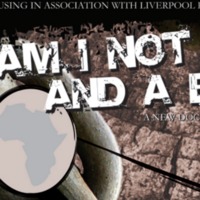
Am I Not a Man and a Brother?
Am I Not a Man and a Brother? was a piece of documentary theatre devised by Reveal Theatre Company in partnership with North Staffordshire Racial Equality Council. It used stories and testimony from the African Caribbean community in Stoke-on-Trent and North Staffordshire, interwoven with historical…
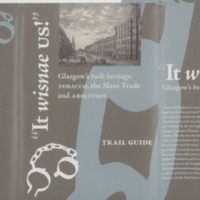
“It wisnae us!” Glasgow’s built heritage, tobacco, the slave trade and abolition
By the mid-18th century, Glasgow dominated Britain's tobacco and sugar imports, and the city was also involved in the slave trade. In 2007 Glasgow Built Preservation Trust (GBPT), in partnership with Glasgow Anti Racist Alliance, developed an exhibition linking Glasgow’s built heritage with the…

Revealing Histories: Remembering Slavery (Museum of Science and Industry)
The Museum of Science and Industry (MOSI) was one of eight heritage bodies in the ‘Revealing Histories: Remembering Slavery’ partnership in Greater Manchester. The project set out to explore the history, impact and legacy of slavery on Britain through collections and community links in the North…
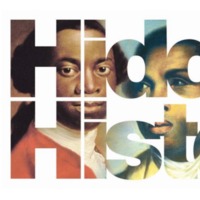
Hertfordshire's Hidden Histories
This partnership project, led by Hertfordshire Archives, investigated the links between Hertfordshire people, the slave trade and abolition through stories from original archival documents. Project outcomes included creative workshops, a booklist, a DVD documentary, a heritage trail booklet, and…
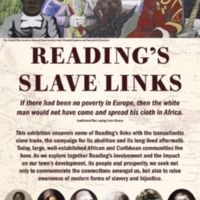
Reading's Slave Links
This exhibition from Reading International Solidarity Centre (RISC) in collaboration with local communities uncovered Reading’s links with the slave trade, the campaign for its abolition and its aftermath. Exploring Reading’s involvement in historical slavery and the impact on the town’s…
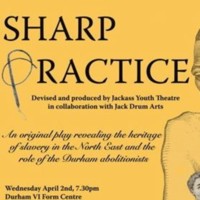
Sharp Practice
Inspired by archival research, ‘Sharp Practice’ was a touring play exploring the slave trade and the role of abolitionists from the North East of England in its demise (and, in particular, the work of Granville Sharp). The play was devised and produced by Jackass Youth Theatre, in collaboration…
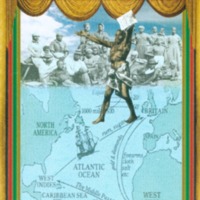
Leeds Bicentenary Transformation Project
This collaborative community initiative celebrated African and Caribbean culture in Leeds, with a focus on commemorating the Abolition Act by 'highlighting African achievement, liberation and aspirations'. New exhibitions, publications and resources were produced and over 100 bicentenary events…